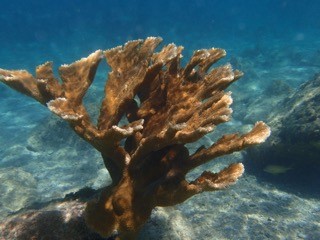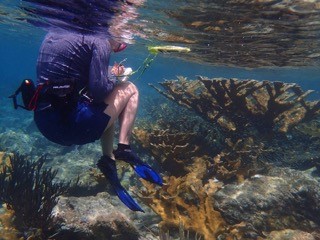In a significant way, Hollins University’s profile in the field of marine biology is about to rise.
Natasha Bestrom ’18, a Horizon alumna who double-majored in biology and environmental studies, is the lead author of a Hollins study on coral populations in the U.S. Virgin Islands that is being finalized for publication in the peer-reviewed journal, Caribbean Naturalist. The journal focuses on biological and ecological research related to terrestrial, freshwater, and marine organisms and environments in the Caribbean region.
“It’s that validation of, ‘You did really good work, it’s relevant, and it’s important to the broader community. It’s something people need to know about,’” Bestrom says.
A native of Greensboro, North Carolina, Bestrom loved the water as a child. Even “without knowing exactly what it meant,” she wanted to be a marine biologist someday. “But going to college right out of high school was very intimidating,” she recalls. She spent the next 11 years after completing her secondary education working as a veterinary technician. “I loved it, but I wanted something more.”
Bestrom was long drawn to the women’s college environment, and when she moved to Roanoke in 2013, she enrolled at Hollins. “I met with the Horizon program, toured the biology department, and walked away immediately saying this is where I wanted to go. It was just that friendliness. I loved how Horizon wasn’t an adult program that was separate from the rest of the community. I could experience a traditional college education and learn from students who were younger than me.”
That experience included opportunities for field research and study abroad. She was intrigued her first year when a fellow Horizon student told her about a research trip Professor of Biology Renee Godard was organizing for the 2014 January Short Term to St. John in the U.S. Virgin Islands. “I had no idea what it was all about, but I applied and got accepted. It honestly and completely changed everything I thought I wanted to do at Hollins. Initially, I wanted to do some behavioral genetic work, but after that first J-term I said, ‘No. I want to be in the field, I want to be in the water, I want to be exploring marine ecosystems.’ It was so fascinating to me, all the interactions between species and how little we still know about it.”

Bestrom participated in the St. John research course each J-term during her Hollins career as well as conducting research for consecutive summers beginning in 2017 with her senior thesis research. “Renee and I were looking at whether the population of elkhorn coral, an endangered species of coral, was increasing,” she explains. “We felt we had seen more colonies over the years but didn’t have any data to back that up.”
In July 2017, Bestrom and Godard collected data at 11 different sites around the island and the initial results were encouraging: The coral density was in fact growing at a number of the sites. “We had what looked like a recovering population of an endangered species. This was important to the ecosystem since elkhorn coral are major reef-builders and they provide a lot of habitat and protection to coastal regions.”
Then, two Category 5 hurricanes, Irma and Maria, struck St. John that fall. It became imperative to go back to the island in the summer of 2018 to determine how much devastation had occurred. “Certain areas seemed to get hit harder than others and the decreases in population ranged from 25 to 30% in some areas to 75% in others,” Bestrom says. “Overall, the total colony number in the areas we studied fell 44%.”
Yet, Bestrom found some positive news for the elkhorn coral colonies: They took less of a hit than elkhorn populations in other areas of the Caribbean, possibly due to the fact that they are located in a protected national marine park and are more resilient.

Bestrom and Godard then combined the data from these two years of study and pursued publication in Caribbean Naturalist. Peer review means exposing your work to intense scrutiny, “especially since Hollins isn’t well-known within the marine biology community,” Bestrom says. “You have to find a story within the data, put it into words, and talk about it in a way that people can understand. Where did your data lead? What does it mean within the general context of the other science that’s out there already? How is it relevant to what we’re dealing with now in society and the issue of climate change?”
Bestrom credits the spirit of collaboration she’s enjoyed in the biology and environmental studies departments at Hollins for bolstering her skills in research and analysis. “Learning from one another is a constant. Renee and I have obviously been working together for a long time and have a great rapport, but we have also benefited from the other faculty in the program. It’s great to be in a place where people aren’t afraid to say, ‘I don’t know, but let’s ask someone who may know and try figuring out this problem by moving through different avenues.’ Being able to say, ‘I don’t know’ and ‘I wonder’ – that’s science. That’s what it’s really all about, and that’s what a publication is all about. It’s not about just getting my name out there. It’s about getting the information out there so maybe we can be more effective in conserving this species. That’s the most exciting part.”
With the coral research on St. John and its pending publication, along with a semester of studying tropical island biodiversity in Panama through the School for Field Studies in the spring of 2018, Bestrom has built an impressive experiential record. Currently, she is exploring graduate school programs, particularly those focused in marine biology at either a Master’s or Ph.D. level. “I’m trying to figure out what direction I want to take with a career in marine biology. I would love to be in the field doing research, but I’m also looking at teaching at the college level. That would allow me to share my passion for the ecosystem while continuing to conduct studies.”
If a teaching career becomes her vocation, there’s no doubt Bestrom’s Hollins experience will inform it. “To come to a place where the focus is so much on the student and making sure they get everything out of their education here…it made a world of difference for me. I don’t think I would have been able to find that elsewhere, and I can’t imagine going to any other university.”











